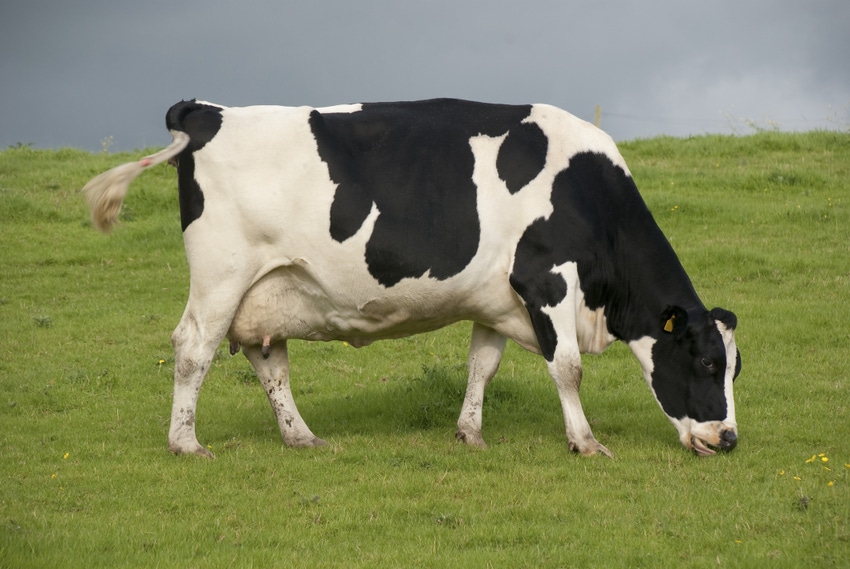DSM to begin Dutch accreditation trial on methane inhibitor
Company expects to gain market authorization for 3-NOP in Europe in late 2020 or early 2021.

Royal DSM announced Sept. 30 that it is taking the next step in implementing its methane inhibitor 3-nitrooxypropanol (3-NOP) in the Netherlands through a trial at the Dairy Campus in Leeuwarden, Netherlands, that aims to gather all information necessary for accreditation of its 3-NOP (Bovaer) by the Netherlands' Carbon Footprint Monitor/Climate Module of the Kringloopwijzer (the Annual Nutrient Cycling Assessment).
DSM said the 3-NOP trial was designed with a consortium from across the Dutch dairy chain comprised of DSM, Wageningen University & Research (WUR), FrieslandCampina, Agrifirm, De Heus and ForFarmers, the announcement said. The trial will deliver methane reduction results for different ratios of grass silage and corn silage diets typical for circumstances in the Netherlands and different dosages of the product.
The trial will run from November 2019 until February 2020 and will be supervised by WUR cattle nutrition experts André Bannink, Sanne van Gastelen and Jan Dijkstra, DSM said, noting that the knowledge gained in this study will be applicable across Europe.
This trial builds on results from 24 previous dairy trials that proved the safety and effectiveness of 3-NOP, DSM said. In the new trial, the aim is to study the interaction between different diets and dosages of 3-NOP and the effect on the degree of methane reduction as key inputs for future use in carbon footprinting tools and associated economic models, the company explained.
Participating feed producers Agrifirm, De Heus and ForFarmers said, “We have a big challenge ahead of us in the Netherlands. Within the National Climate Agreement, we have agreed that the agricultural sector will deliver a contribution to making our food production more sustainable. A part of that commitment is to further reduce the greenhouse gas emissions of the sector, for example, by reducing the methane emissions from the cow’s rumination process with practical, economical and animal-friendly solutions. This has the potential to create added value for our dairy products and could contribute to increasing public support for the way we produce our food in the Netherlands."
The companies added, "That is why we — Agrifirm, De Heus and ForFarmers — participate in the experiments that will be run at the Dairy Campus in Leeuwarden in the coming months, together with DSM, FrieslandCampina and Wageningen University & Research. These experiments should elucidate to which extent the additive mitigates methane emissions. After this trial, further investigations are required to evaluate the feasibility, business case and technical on-farm application of the product.”
In a media backgrounder, DSM explained that 3-NOP is a first result of its "Project Clean Cow," a 10-year research and development journey. Over the past 10 years, 35 on-farm beef and dairy trials have been conducted across the globe and in various feeding systems, DSM said, noting that these trials showed that an enteric methane reduction of about 30% can be consistently achieved. In addition, DSM said more than 25 peer-reviewed studies have been published that fully clarify and prove the mode of action.
DSM said it is working with partners from the dairy value chain across the globe to prepare for market introduction of 3-NOP. These activities include trials to confirm the product's effectiveness in local farming systems and to further build up its practical on-farm experience. In Denmark, Norway, the U.K. and Ireland, trials are planned with local scientific institutes and partners from the dairy chain to commence in 2020.
In Australia and New Zealand, DSM is working with industry and research institutes to develop a pasture-based application model for 3-NOP. Work conducted at New Zealand's AgResearch and Australia's Commonwealth Scientific & Industrial Research Organization has successfully investigated a number of forms and feeding models of 3-NOP for different pasture feeding systems common in both New Zealand and Australia, DSM reported. Trials are planned through 2020 with customers to validate these application models in commercial settings.
DSM explained that just a quarter-teaspoon of 3-NOP per cow per day suppresses the enzyme that triggers methane production in a cow’s rumen, that it takes effect immediately and is safely broken down in the cow’s normal digestive system. When the additive is no longer included in the cow's diet, full methane production resumes, and there are no lasting effects in the cow, the company said.
DSM said it has recently filed for registration of Bovaer in Europe, where it will be available as soon as market authorization is granted, with a launch in the region anticipated in late 2020 or early 2021. Registrations of the feed additive in other regions will follow, DSM said.
About the Author(s)
You May Also Like



